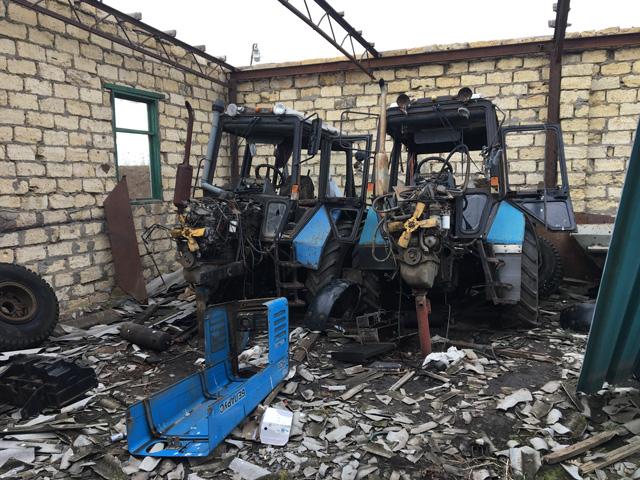A Visit to Ukrainian Farms - 2
30-Year-Business Destroyed in an Instant: Ukrainian Vegetable Farmer Shares Impact of Russian Attacks
Editor's note: Ukrainian agricultural journalist Iurii Mykhailov lives in Kyiv and visited farmers affected by the Russia-Ukraine war. He provided freelance content to the Japanese publication, The Japan Agricultural News, as well as to DTN/Progressive Farmer. This is the second of his four stories.
**
KYIV, Ukraine (DTN) -- Last month, Ukrainian agricultural journalist Iurii Mykhailov visited a vegetable farmer in the Mykolaiv region of Ukraine. Adam Melnik, 64, farms near a village about 9 kilometers (5.5 miles) east of Mykolaiv, a city near the Black Sea in southern Ukraine.
The following is a translated Q&A that Mykhailov did with Melnik on his farm.
Mykhailov: Adam, how did you become a farmer?
Melnik: I started farming 30 years ago. In the 1990s, when the collective farms were collapsing, I had the opportunity to cultivate their fields and grow grain. But my partner, a refugee from the Balkans -- an excellent agronomist and vegetable grower -- convinced me to start growing vegetables.
From the mid-1990s, in Ukraine began to appear supermarkets, which wanted to provide customers with vegetables throughout the year. We took advantage of the fact that at that time, banks were selling properties that were pledged by collective farms for loans and could not be repaid. We bought in installments one of these vegetable warehouses.
At the same time, my partner convinced me to also build a small cafe, which remained intact and operates to this day in Mykolaiv.
Mykhailov: So, what kind of vegetables did you grow?
P[L1] D[0x0] M[300x250] OOP[F] ADUNIT[] T[]
Melnik: Before the war, we grew onions, carrots, beets, and cabbage on 150 hectares (370 acres) of land. We also grew seed potatoes for a scientific institute near Kyiv, and we grew corn and green manure (cover crops used for fertilizer) on another 150 hectares.
We sold part of the grown vegetables immediately, and part of them was placed in vegetable warehouses for storage for sale during the year. We also processed some of the vegetables into canned vegetables at our own cannery. We produced canned tomatoes in glass jars of 1.8 liters (1.9 quarts) and carrot juice in glass jars of 1 liter. We even sold our juices in the USA, Canada and Germany.
Mykhailov: Did your business suffer from the Russian invasion?
Melnik: A couple of days after the start of the war, our fields came under cross-bombardment by the Russians and the Ukrainian army. The onions we sowed were all destroyed. For a short time, we came under Russian occupation.
Our biggest losses in the war are lost buyers of our products and the skilled workers.
Mykhailov: How many people do you employ?
Melnik: In general, about a thousand people worked on the farm. As early as Feb. 23 (2022), all our workers were working, and already on Feb. 24, when the invasion of Russian troops began, no one went to work. Many people evacuated to Western Ukraine and abroad, primarily women with underage children. Now we have about a dozen employees left. We need to return experienced workers, but now it is very difficult.
Mykhailov: Had Russians done any damage to your farm?
Melnik: Greenhouses, a workshop, a garage for machinery, houses, tomato and potato harvesters, tractors, and planters were destroyed due to bombing and shelling. The Russians deliberately damaged a 700-meter (765-yard) long water pipe for irrigating vegetables by driving over it with tanks. Fortunately, the greenhouses and the cannery remained almost intact, but now the latter is not operating, because we have no raw materials for processing.
Russians engaged in looting. They, for example, stole irrigation pumps and cut copper cables.
Mykhailov: What are you going to do to restore your business?
Melnik: After the retreat of the Russians in April last year, we decided to demine the fields, but our military did not allow us to do demining on our own. During this time, the fields were overgrown with weeds. Only now the fields have been demined, but the time for sowing vegetables has long passed. Therefore, now we are just preparing to plant tomatoes and carrots. But first, we need to remove the weeds that have grown over this time. We will be able to plant only 30 hectares (74 acres) of land this year.
Before the war, we sold tens of thousands of tons of vegetables to supermarkets such as Metro Cash&Carry; now, supermarkets refuse to work with us because we cannot provide the required volume of vegetables.
To some extent, the financial situation is eased due to the functioning of our cafe, though the volume of vegetables we sell through it accounts only maybe for 1% of what we previously sold to supermarkets.
I see the only way out to continue the business is to cooperate with other farmers to somehow provide myself with equipment and workers.
My 30-year-old business was destroyed in an instant.
**
During the next few days, DTN will publish the translations of two more interviews with the farmers: the chairman of a dairy farmers' cooperative in the Mykolaiv region, and a farmer from the Chernihiv region who grows grain.
**
To see the first story in this special package, "Ukrainian Farmers Share How War Clashes Affected Them in Ukraine," go to https://www.dtnpf.com/….
To see recent coverage by DTN Ag Policy Editor Chris Clayton, "Ukraine Grain Shipping Struggles Mount," see https://www.dtnpf.com/….
Also see "Russia, Ukraine Harden Lines on Black Sea and Grain Shipments as Strikes on Ports Continue" at https://www.dtnpf.com/….
(c) Copyright 2023 DTN, LLC. All rights reserved.




